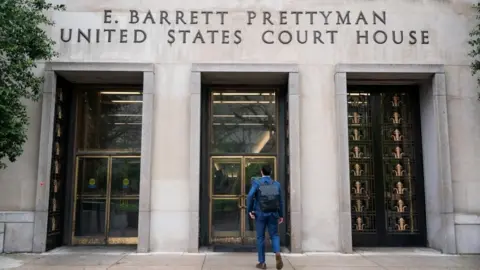Zuckerberg defends Instagram purchase in Meta monopoly trial
 Reuters
ReutersMeta boss Mark Zuckerberg defended his company's purchases of photo-sharing app Instagram and messaging service WhatsApp in testimony on Tuesday.
He took the witness stand for a second day in a landmark monopoly case brought by the Federal Trade Commission in Washington.
Lawyers for the FTC asked Mr Zuckerberg if Meta could have built its own app to compete with Instagram instead of buying the competitor.
"I'm sure we could have built an app," he responded. "Whether it would have succeeded or not I think is a matter of speculation."
"Building a new app is hard," Mr Zuckerberg said when asked about a 2012 email he sent to Facebook's then-Chief Operating Officer Sheryl Sandberg.
In the email displayed by the FTC, Mr Zuckerberg had written to Sandberg: "Instagram is growing so much faster than us that we had to buy them for $1 billion."
- Mark Zuckerberg defends Meta in social media monopoly trial
- Landmark antitrust trial could force Zuckerberg to sell Instagram
The email also referenced Facebook's Messenger, which Mr Zuckerberg wrote wasn't "beating WhatsApp." The company acquired WhatsApp two years later.
"Many more times than not, when we've tried to build a new app, it hasn't gotten a lot of traction," Mr Zuckerberg said in the Washington, DC court Tuesday.
The FTC is trying to prove that Meta unfairly dominated the market through its acquisitions of Instagram and WhatsApp. The US antitrust watchdog is seeking a breakup of the company.
Meta claims there's plenty of competition in social media, including from apps such as TikTok, X, and YouTube.
In the opening days of the trial, the FTC has been pressing Mr. Zuckerberg "very hard to explain comments that suggest there was anxiety about Instagram emerging as an independent competitive force," said Professor William Kovacic, Director of the Competition Law Center at the George Washington University Law School.
"The FTC is arguing that life would have been better if Instagram had continued to develop independently and become a social network on its own," he added.
That's a difficult conclusion to prove, Mr Kovacic said, and could be a vulnerability for the FTC as it makes its case.
Mr Zuckerberg was also pressed about a 2018 email that showed he considered pre-emptively hiving off some of his purchases amid mounting scrutiny from antitrust regulators.
"As calls to break up the big tech companies grow, there is a non-trivial chance that we will be forced to spin out Instagram and perhaps WhatsApp in the next 5-10 years anyway," he wrote.
In testimony on Monday, Zuckerberg said he wanted to buy Instagram because of its camera technology, not because of its social network.
But the app is now one of the company's most important properties.
Instagram was expected to account for more than half of Meta's advertising revenue in the US in 2025. according to research firm Emarketer.
The antitrust trial is expected to draw several high-profile witnesses in addition to Mr Zuckerberg.
Ms Sandberg and Instagram co-founder Kevin Systrom also are expected to take the stand in the trial, which is set to last for several weeks.
US District Judge James Boasberg is presiding and will rule in the case. If he sides with the FTC, the case will enter a second phase aimed at determining how to remedy Meta's alleged monopoly.
